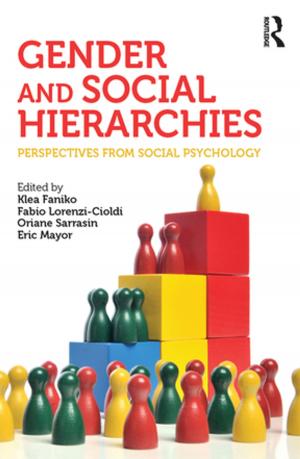Rethinking Utopia
Place, Power, Affect
Nonfiction, Religion & Spirituality, Philosophy, Political, Social & Cultural Studies, Political Science, Social Science| Author: | David M. Bell | ISBN: | 9781317486701 |
| Publisher: | Taylor and Francis | Publication: | January 20, 2017 |
| Imprint: | Routledge | Language: | English |
| Author: | David M. Bell |
| ISBN: | 9781317486701 |
| Publisher: | Taylor and Francis |
| Publication: | January 20, 2017 |
| Imprint: | Routledge |
| Language: | English |
Over five hundred years since it was named, utopia remains a vital concept for understanding and challenging the world(s) we inhabit, even in – or rather because of – the condition of ‘post-utopianism’ that supposedly permeates them. In Rethinking Utopia David M. Bell offers a diagnosis of the present through the lens of utopia and then, by rethinking the concept through engagement with utopian studies, a variety of ‘radical’ theories and the need for decolonizing praxis, shows how utopianism might work within, against and beyond that which exists in order to provide us with hope for a better future.
He proposes paying a ‘subversive fidelity’ to utopia, in which its three constituent terms: ‘good’ (eu), ‘place’ (topos), and ‘no’ (ou) are rethought to assert the importance of immanent, affective relations. The volume engages with a variety of practices and forms to articulate such a utopianism, including popular education/critical pedagogy; musical improvisation; and utopian literature. The problems as well as the possibilities of this utopianism are explored, although the problems are often revealed to be possibilities, provided they are subject to material challenge.
Rethinking Utopia offers a way of thinking about (and perhaps realising) utopia that helps overcome some of the binary oppositions structuring much thinking about the topic. It allows utopia to be thought in terms of place and process; affirmation and negation; and the real and the not-yet. Itengages with the spatial and affective turns in the social sciences without ever uncritically being subsumed by them; and seeks to make connections to indigenous cosmologies. It is a cautious, careful, critical work punctuated by both pessimism and hope; and a refusal to accept the finality of this or any world.
Over five hundred years since it was named, utopia remains a vital concept for understanding and challenging the world(s) we inhabit, even in – or rather because of – the condition of ‘post-utopianism’ that supposedly permeates them. In Rethinking Utopia David M. Bell offers a diagnosis of the present through the lens of utopia and then, by rethinking the concept through engagement with utopian studies, a variety of ‘radical’ theories and the need for decolonizing praxis, shows how utopianism might work within, against and beyond that which exists in order to provide us with hope for a better future.
He proposes paying a ‘subversive fidelity’ to utopia, in which its three constituent terms: ‘good’ (eu), ‘place’ (topos), and ‘no’ (ou) are rethought to assert the importance of immanent, affective relations. The volume engages with a variety of practices and forms to articulate such a utopianism, including popular education/critical pedagogy; musical improvisation; and utopian literature. The problems as well as the possibilities of this utopianism are explored, although the problems are often revealed to be possibilities, provided they are subject to material challenge.
Rethinking Utopia offers a way of thinking about (and perhaps realising) utopia that helps overcome some of the binary oppositions structuring much thinking about the topic. It allows utopia to be thought in terms of place and process; affirmation and negation; and the real and the not-yet. Itengages with the spatial and affective turns in the social sciences without ever uncritically being subsumed by them; and seeks to make connections to indigenous cosmologies. It is a cautious, careful, critical work punctuated by both pessimism and hope; and a refusal to accept the finality of this or any world.















